Does the NFL have a crime problem?
- Published
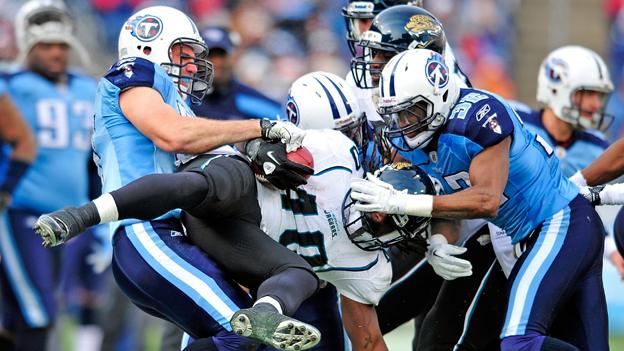
To some the US's National Football League is synonymous with violence - legitimate violence where men weighing 300lbs (136kg) or more collide like crashing trains. But it's the violence off the field of play that's currently causing concern. Does the NFL have a crime problem?
Last week Aaron Hernandez, 23, one of the NFL's elite players playing for one of the league's elite teams, the New England Patriots, was charged with murder. Further charges may follow as police investigate whether he was involved in an unsolved double homicide, which took place last year.
It's not an isolated case. NFL players have been charged with any number of crimes over the years, from rape to dog-fighting. Twenty-nine players have been arrested since February.
Another NFL star, Ray Lewis, 38, who won the Super Bowl this year with the Baltimore Ravens was charged with the murder of two men outside a nightclub in Atlanta in 2000. He subsequently negotiated a plea agreement, where the murder charges against him were dismissed in exchange for his testimony against two other men accused of involvement.
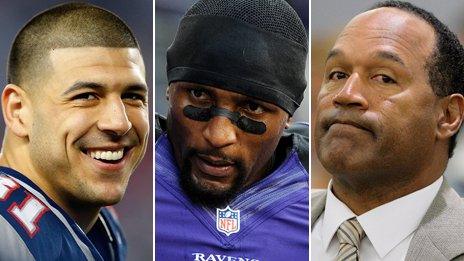
Aaron Hernandez, Ray Lewis and OJ Simpson have all faced murder charges
And six years before that perhaps the biggest murder case of them all, involving former NFL star OJ Simpson. Simpson was found not guilty of killing his ex-wife Nicole Brown and her friend Ronald Goldman in a criminal court but a civil court disagreed and ordered him to pay $33.5m in damages to the victim's families.
Simpson is currently serving a 33-year jail sentence in Nevada after he was found guilty of committing armed robbery and kidnapping in 2008.
These high profile cases have led fans and the media to ask whether the NFL has a crime problem.
But what do the numbers tell us?
Brent Schrotenboer, a sports writer for USA Today, has compiled a list of NFL Arrests Database. It lists 664 arrests from 2000. That sounds like a big number but put in context, Schrotenboer says, it's not.
"The NFL arrest rate for active players is around one in 47 but in the general population the arrest rate is actually double that, it's about one in 25. It's a surprise. It seems like you hear about an NFL arrest every week but it turns out they're still better behaved than regular society."
When the general population numbers are broken down even further the NFL players look even more like model citizens. The Bureau of Justice's figures reveal that the arrest rate for men is one in 15.
Active NFL players are aged, in the main, between 21 and 34 and the arrest rate for that demographic is one in 8. The arrest rate for people of Aaron Hernandez's age - he's 23 - is a startling one in 6.
It needs to be pointed out that it's not that one in six 23-year-old men in the US get arrested every year. The figures are for arrests, not people. Some people are arrested time and time again - prolific burglars, for example - and this will bump up the arrest figures.
Some NFL players are repeat offenders too. Cincinnati Bengals corner back Adam "Pacman" Jones has been arrested, charged or cited eight times since 2005.
But in general terms there are about six times as many arrests among the general population of young American men, as there are among football players.
Even US women are more likely to be arrested than players - albeit by a small margin. Their arrest rate is one in 46.
One in 46 was the overall arrest rate in the UK in 2010. The arrest rate for men was one in 27 and for women it was one in 145.
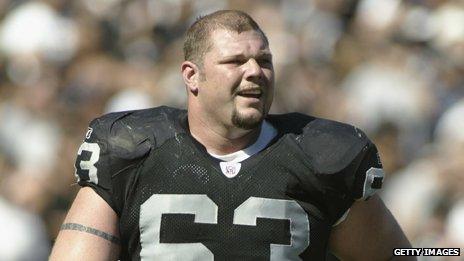
Ex-Oakland Raiders player Barret Robbins has been convicted of a string of offences since being released in 2004, including attempted murder
It wasn't possible to look at the arrest rate for a particular age group as there wasn't available data.
When the NFL players do transgress there is one particular crime they commit regularly - drink driving.
In December 2012 Dallas Cowboys player Josh Brent was charged with the intoxication manslaughter of his teammate Jerry Brown. Police estimated that Brent had been travelling at up to 134mph while over the legal limit.
In 2009 Cleveland Browns player Donte Stallworth was convicted of intoxication manslaughter after hitting a man with his car in Florida.
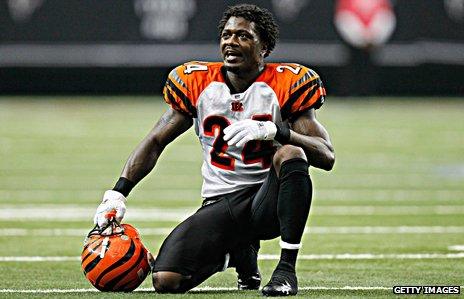
Cincinnatti Bengals player Adam Jones has been in regular trouble with the law
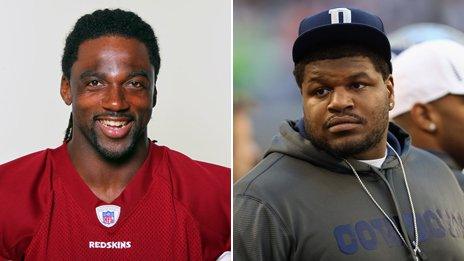
Donte Stallworth (l) was convicted of intoxication manslaughter in 2009, while Josh Brent awaits trial for the same offence after an incident in 2012
But again the figures don't really suggest that the NFL has a drink driving problem.
"Drunk driving makes up 30% of all active player arrests during a year," says Schrotenboer.
"But the drink driving arrest rate is about half that of their age bracket in the US general population."
So why do negative perceptions surround the NFL?
Many argue that it's because of the high profile of the players and also because the NFL season is comparatively short compared to other US sports (the regular season lasts for only four months) but the demand for news coverage is 24/7 and that inevitably leads to off-season stories, which invariably prove negative.
Other critics would argue that the one in 47 figure is still too high because unlike a lot of the general population the players had an education in college, earn very good money and live in safe neighbourhoods.
NFL and crime: Elsewhere on the web
Back in 2007, controversial radio host Rush Limbaugh, external likened watching NFL to "a game between [criminal gangs] the Bloods and the Crips without any weapons". He went on to talk about the colour black appearing on the kits: "I know that that has roots supposedly - I've been told it has roots in gang culture."
And at the end of 2012, following an NFL player's arrest for intoxication manslaughter and another murder-suicide in quick succession, Jeffrey Chadiha of ESPN, external said that the onus is on the NFL to act. Although stating that the problems are no different from wider society, he noted: "One tragic death is already too many for the NFL. Two tells us that some players aren't nearly as in control of their actions as they might think. How many drunken driving stories have we heard in this year alone? How many tales of domestic violence get reported every season? An alarming number of NFL players find it necessary to own a gun."
Tom Keane, writing in the Boston Globe, external, says that the only surprise about the recent arrest of Hernandez is that it doesn't happen more often. "The myth about crime and professional athletes arises because it's easy to find examples. But anecdotes can hide truth, not reveal it. It seems as if NFL players are committing so many crimes because every time they do, they make the news. It's the same kind of thinking that leads people to erroneously believe air travel is more dangerous than automobile. Every time a plane goes down we read about it. Car crashes go largely unreported."
"It's not as simple as some want you to think," says Mike Freeman in CBS Sports, external, adding that much of it is "complicated guesswork". He writes that "there is no scientific data to show NFL players are more criminally inclined", largely because there is no scientific research into it at all. But he also highlights the problem of comparing NFL players to national statistics. Unlike NFL players, most of the country doesn't have access to top-notch educations, sizeable bank accounts, live in the best areas and are championed in many cases as heroes."
Listen to More or Less on BBC Radio 4 and the World Service, or download the free podcast
You can follow the Magazine on Twitter, external and on Facebook, external